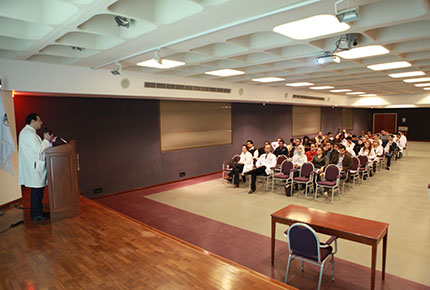Roadmap to residency
Gilbert and Rose-Marie Chagoury School of Medicine hosts its annual career fair for residency.
For medical students, choosing a residency program is perhaps one of the most daunting decisions of their entire career. To make this process a little easier, the Office of Clinical Affairs at the Gilbert and Rose-Marie Chagoury School of Medicine hosted an annual career for residency on February 14 at the LAU Medical Center-Rizk Hospital.
“This event complements the career advising program supplied to medical students throughout four years of study,” says Dr. Vanda Abi Raad, associate professor at SOM’s Department of Anesthesiology and program director. Adding: “We want our students to be fully prepared and secure the best possible residency placement they can.”
The daylong event was in step with the university’s commitment to student-centeredness and attracted over 100 attendees allowing medical students to connect with physicians from a variety of specialties, such as surgery, neurology, radiology and dermatology, along with relatively untraditional branches such as social and emergency medicine.
Dr. Jacques Mokhbat, associate dean of graduate medical education, informed the students of the necessary steps to apply for residency at LAU Medical Center–Rizk Hospital and other local hospitals, while Dr. Sola Aoun Bahous, associate professor of medicine and assistant dean for clinical affairs, explained the procedure for international applications.
A highlight of the event was a comprehensive presentation given by Dr. Elias Arbid, program director for surgery at SOM and chief of vascular surgery at LAU Medical Center–Rizk Hospital, entitled ‘Roadmap to Residency.’ He painted a detailed picture of what it takes to land a successful residency match and provided attendees with relevant resources to help them in their pursuit. “The first step is for the students to do an honest self assessment and ask themselves the questions: What do I love to do? What am I good at? How competitive am I? What kind of lifestyle do I want?”
“Choosing a residency is a huge decision; you will be doing this every day for the rest of your life and if you are not happy then nobody else will be,” he warns, adding, “To find a successful match, in-depth research needs to be conducted first.” To this end, Arbid offered commonsense tips to enhance the students’ chances and a practical list of do’s and don’ts.
“The event is an opportunity to break down what is considered a highly stressful procedure into manageable components,” says fourth-year medical student Serge Korjian. “It is a truly valuable experience to have an entire day dedicated to post-graduate career opportunities and the ability to speak to experts in the field,” he adds.
His colleague Edward Sayad agrees wholeheartedly. “Planning and doing research are essential aspects of this process—as Dr. Arbid says, we must respect the process.” Both students gave presentations to their fellow colleagues about their own personal experiences on the road to residency. “The most important thing to remember is perseverance and being engaged,” Sayad adds.
Talking of residency training in his own field, neurosurgery, SOM Dean Dr. Youssef Comair stressed that, “in order to take part in a competitive race for best residency placements they [the students] have to be outstanding.” It is with the aim of providing the best placement opportunities that Comair has signed numerous agreements with schools both in Lebanon and abroad.
More
Latest Stories
- Blending Coding Education With Career Exploration
- LAU Alumnus Helms Seminar on Entrepreneurship and Sustainability
- On Point Celebrates Student Innovation and Commitment to Accreditation
- LAU Kicks off the Seventh Season of the Jr. NBA League
- Bridging Policy, Science and Society to Tackle Lebanon’s Environmental Challenges
- Understanding a Core Security Gap in Drone Operations
- LAU’s AKSOB Hosts a Timely Debate on Digital Banking and the Future of Finance
- LAU Study Maps Antibiotic Resistance in Lebanese Wastewater


